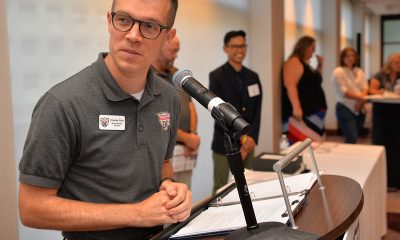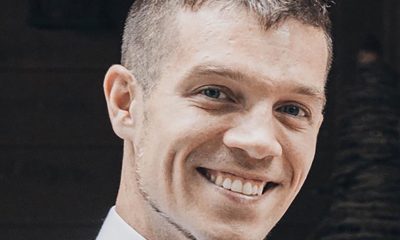Sports
Meet D.C.’s multi-sport athletes
Finding competition, camaraderie on the field
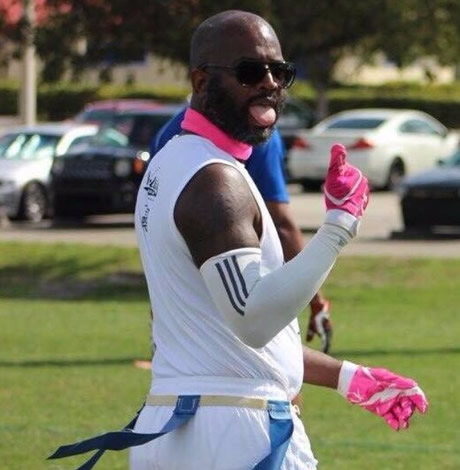
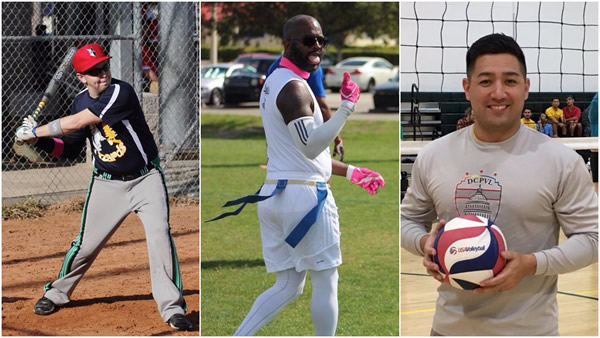
Tony Mace, Kevin Smiffy and Michael D’Zgoda play multiple sports in D.C.’s LGBT leagues. (Photos courtesy Mace, Smiffy, D’Zgoda)
D.C. is home to one of the largest LGBT sports communities in the world. For decades, the various LGBT sports teams operated within their own realms, traveling to tournaments around the United States as well as internationally.
The onset of multiple LGBT sports leagues and the cohesion provided by Team DC, the local information clearinghouse for gay sports, has fostered a thriving sports community that plays year-round.
Events like Team DC SportsFest, multi-sport mixers and teams volunteering at other team’s sports functions has led to many athletes crossing over into multiple sports. The days of not having a safe space to compete are gone and members of the LGBT community are able to flourish on multiple teams. Along with loving sports, these athletes are also masters of time management.
Tony Mace knew there had to be a community out there that was just like him. Growing up in Indianapolis, he was a three-sport athlete in high school in tennis, basketball and baseball. He played intramural sports while attending Indiana State University and eventually transferred to George Mason.
While he was fulfilling an internship at Walt Disney World in 2007 in Orlando, he came across a gay softball league. He joined and was at his first gay tournament in San Jose, Calif., within two weeks. He was immediately smitten and at a tournament in Milwaukee he met one of his future partners.
“At first, he didn’t tell me he had a partner, but 10 years later the three of us are still together,” says Mace. “I moved that year to D.C. because of them and the tie I already had to the gay softball community.”
Mace, who manages a hair salon for Urban Adventures, now plays in all the Chesapeake and Potomac Softball Leagues along with playing in straight leagues. In the spring, he plays softball four days a week and travels to six to nine gay tournaments per year.
“Finding the North American Gay Amateur Athletic Alliance (NAGAA Softball) and this community was like finding my brothers and sisters,” Mace says. “Sports is my everyday life and it’s who I am as a person. If I could get a sports job, I would be in heaven.”
Both of his partners were bowling with the Capital Area Rainbowlers Association so he started bowling and found that it also kept him connected with the other softball players who were bowling in the league.
His best friend in the softball league was playing basketball with the DC Sentinels, so Mace joined the Washington DC Gay Basketball League and has traveled with them to tournaments winning a title at the Coady Roundball Classic in Chicago.
“I love sports and would play even more if time allowed,” says Mace. “The only television I watch is ESPN and I study sports constantly. You could say I am hooked.”
The list of sports that Kevin Smiffy has played in the LGBT sports community reflects a man that likes to compete. His past sports have included Chesapeake and Potomac Softball, Capital Area Rainbowlers, DC Front Runners, Washington DC Gay Basketball, Stonewall Kickball, Stonewall Darts, Stonewall Billiards and the DC Gay Flag Football League.
“It’s true, I love competition and I have met a lot of lifelong friends, especially through traveling, that are like-minded,” says Smiffy. “People you can talk about sports with and not just about who has the coolest uniform.”
When he was a kid in D.C., Smiffy played football, basketball, baseball and ran track. He would continue in intramurals while finishing his degrees at Florida State, Howard University and the University of the District of Columbia. His first sport in the LGBT community was CAPS softball in 1994 and from there he continued to add new ones to his list.
“It’s been a great ride so far and it keeps me active and in shape,” Smiffy says. “As I have gotten older, it also keeps me young running around with all these kids.”
Smiffy, who works for the Internal Revenue Service, says his main sport has always been the DC Gay Flag Football League and he has been with it since its inception in 2010, along with playing on one of the travel teams. Anyone who knows Smiffy, knows about his sense of style and has probably seen some of his 250 pairs of shoes.
“You know you have to coordinate your uniform, and I do love a new set of cleats,” says Smiffy, laughing. “I’m thinking Capital Tennis might be up next, and of course I will need new shoes.”
Michael D’Zgoda recites many reasons for playing multiple sports; his competitive urges, trying new things, having fun with friends, having other people depending on him, and a strong dislike for working out.
“Sports are a big part of my life and it is great that we have such a robust gay sports community in D.C.,” says D’Zgoda. “I really wanted to play softball recently but my husband said I cannot play one more sport.”
D’Zgoda’s first love growing up was soccer and he played volleyball and ran track in high school. After attending Syracuse University, he played club and intramural sports while attending the Air Force Academy. He discovered rowing while at Cambridge for graduate school and the DC Strokes Rowing Club would be his first LGBT sport in D.C. in 2005.
He followed that up by starting an LGBT team in a straight kickball league and then found his primary sport in the DC Gay Flag Football League. He made the travel team after his first season and has been mentoring other players in defense.
For several years he squeezed in soccer with the Federal Triangles Soccer Club and the Summer of Freedom league along with Stonewall Kickball.
It was while attending pick-up volleyball at a struggling LGBT club, that his leadership skills kicked in and he co-founded the successful DC Pride Volleyball League in 2015. Until that point, it was one of the sports that was lacking cohesion in the gay D.C. sports community.
“There are a lot of people who play sports that don’t realize the amount of time it takes to cultivate a league,” D’Zgoda says. “We learned from the trials and tribulations that the other leagues went through how to make this one a success.”
D’Zgoda works for the U.S. Department of State and just last week his job moved him to Recife, Brazil. He says his time in the LGBT sports community of D.C. was filled with camaraderie and the cherry on top was that he was playing with friends.
“I have been getting all the league sign-up emails and I still want to play so bad,” says D’Zgoda. “I will probably get back into tennis while I am in Brazil, but it won’t be the same as playing in the LGBT sports community in D.C. I am really going to miss what I had here.”

FIFA has announced Saudi Arabia will host the 2034 World Cup, despite concerns over its human rights record that includes the death penalty for homosexuality.
The Associated Press reported FIFA confirmed the decision on Dec. 18. The AP noted Saudi Arabia is the only country that bid to host the 2034 World Cup.
“This is a historic moment for Saudi Arabia and a dream come true for all our 32 million people who simply love the game,” said Sport Minister Prince Abdulaziz bin Turki Al- Faisal, who is also president of the Saudi Olympic and Paralympic Committee, in a statement the Saudi Press Agency posted to its website.
Saudi Arabia is among the handful of countries in which consensual same-sex sexual relations remain punishable by death.
A U.S. intelligence report concluded Saudi Crown Prince Mohammed bin Salman “likely approved” the murder of Jamal Khashoggi, a Washington Post columnist, inside the Saudi Consulate in Istanbul in 2018. A federal judge in 2022 dismissed a lawsuit against Prince Mohammed after the Biden-Harris administration said he was immune to the lawsuit because he is the country’s prime minister.
Human rights activists have also criticized the Saudi government over the treatment of women, migrant workers, and other groups in the country.
“No one should be surprised by this,” Cyd Zeigler, Jr., co-founder of Outsports.com, an LGBTQ sports website, told the Washington Blade in an email after FIFA confirmed Saudi Arabia will host the 2034 World Cup. “FIFA, the International Olympic Committee, and many other world governing bodies routinely turn to authoritarian countries with terrible human-rights records to host major sporting events. There are simply few other countries willing to spend the billions of dollars it takes to build the needed infrastructure.”
Peter Tatchell, a long-time LGBTQ activist from the U.K. who is director of the Peter Tatchell Foundation, in a statement described FIFA’s decision as “a betrayal of the values that football should stand for: Inclusivity, fairness, and respect for human rights.”
“This is not about football; it’s about sportswashing,” said Tatchell. “The Saudi regime is using the World Cup to launder its international image and distract from its brutal abuses. By granting them this platform, FIFA is complicit in whitewashing their crimes.”
Qatar, which borders Saudi Arabia, hosted the 2022 World Cup.
Consensual same-sex sexual relations remain criminalized in Qatar.
“Saudi Arabia was the only country to bid for the 2034 FIFA World Cup,” said Zeigler. “So, until FIFA, the IOC (International Olympic Committee) and other governing bodies ban major human-rights violators from hosting, we’ll continue to see events like this in Saudi Arabia, China, Qatar, and other countries with terrible LGBTQ rights issues.”
The Blade has reached out to FIFA and the Saudi government for comment.
Sports
Controversy grows over member of Calif. university’s women’s volleyball team
Coach suspended, NCAA sued, more rivals forfeit
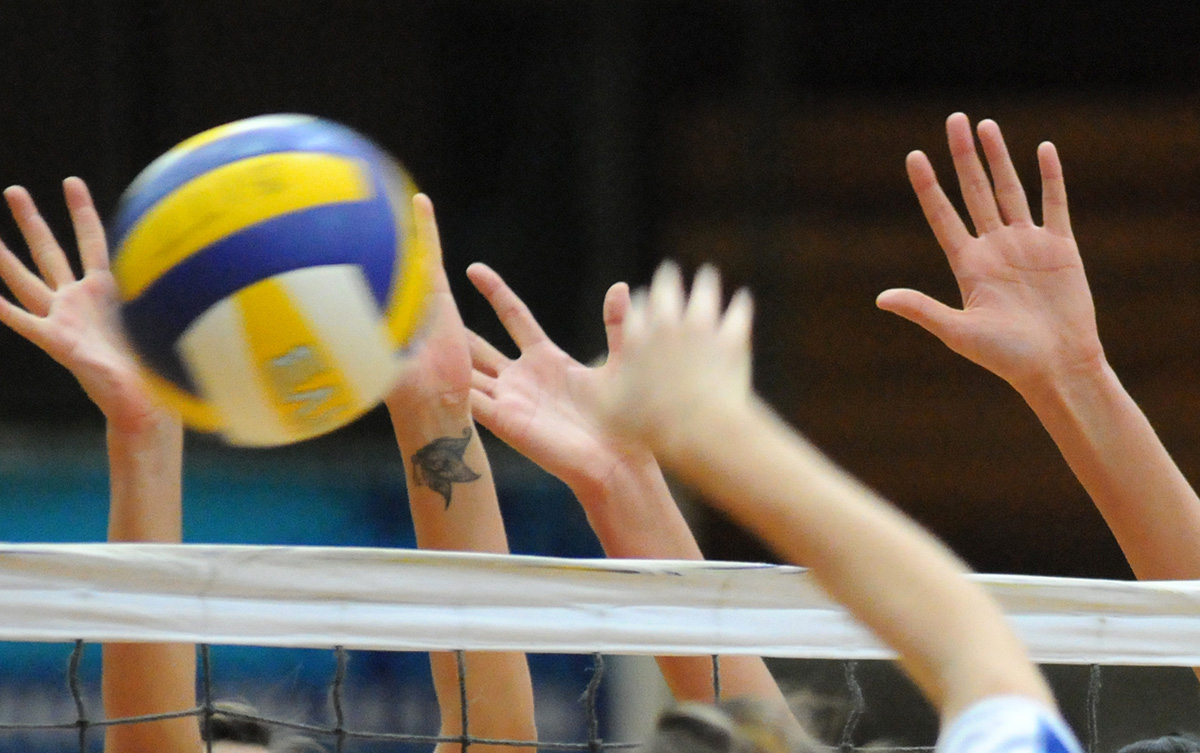
San Jose State University’s women volleyball team has collected yet another W by forfeit — its seventh so far this season — as controversy swirls around one player on its roster. She’s one of the seniors, and she has been dragged in the media by her own co-captain, who outed her as transgender.
The Washington Blade is not naming this student athlete since neither she nor the school have confirmed or even commented on her gender identity.
SJSU visited San Diego last weekend for a match before the Aztecs’ biggest home crowd of the season — including protesters waving “Save Women’s Sports” banners and booing one player on the Spartans team in particular: The woman who is reported to be trans.
Security was tight, with metal detectors and extra guards and police officers present. Video posted to YouTube by a right-wing sports media site — which names the player — shows an angry fan arguing with security about his First Amendment rights.
Video recorded during Nov. 9’s game shows a player for San Diego was injured following a spike by the player rumored to be trans, and had to be helped off the court. However, the video clearly shows that player was injured by landing poorly on one foot, not as a result of the spike.
The Aztecs defeated the Spartans 3-1, but San Jose has still punched its ticket to the conference finals, thanks to its record number of forfeits.
Wyoming was set to visit SJSU Thursday, but for the second time is joining other universities that have forfeited games against the Spartans, all without providing a reason. Boise State announced it will forfeit an upcoming match set for Nov. 21, its second forfeit against SJSU.
In September, the Spartans’ co-captain, senior Brooke Slusser, outed her own teammate, the player at the center of this controversy, in joining a federal lawsuit against the NCAA spearheaded by anti-trans inclusion activist and former college athlete Riley Gaines.
Slusser said in the lawsuit and in subsequent interviews that the player in question shouldn’t be on her team. The suit claims the NCAA’s policy on trans athletes violates Title IX by allowing “men” to compete in women’s sports and use women’s locker rooms where they display “full male genitalia.”
The NCAA policy for trans athletes participating in women’s volleyball aligns with that of USA Volleyball, which requires trans female athletes to suppress their testosterone below 10 nmol/L for a period of one year before competition. That is also how the NCAA determines eligibility. SJSU has stated repeatedly that all its players are eligible.
The lawsuit also asks the NCAA to revoke any titles or records won by trans female athletes in women’s competitions, which seems to be specifically aimed at stripping out trans NCAA champions Lia Thomas and CeCé Telfer of their titles in swimming and track and field, respectively.
Prior to this season, the player rumored to be trans did not attract any attention other than being a successful starter, like Slusser. But now that she is in the media spotlight, Slusser has come forward to tell right wing media, including Megyn Kelly, why she feels another woman two inches taller than she is poses a danger.
“I don’t feel safe,” Slusser said on “The Megyn Kelly Show” last month. “I’ve gone to my coaches and said I refuse to play against [her] … It’s not safe.”
In the video, both Kelly and Slusser refer to the player as “him” and a “man,” and name her.
Now comes another twist: San Jose State University suspended associate head coach Melissa Batie-Smoose with pay, indefinitely, after she filed a Title IX complaint against SJSU. She claims the player Slusser identified as trans conspired with an opponent to help the team lose a match and injure Slusser. Batie-Smoose named the player in question in her complaint and on Sept. 23, joined the same lawsuit that Slusser is now a part of.
“Safety is being taken away from women,” Batie-Smoose told Fox News. “Fair play is taken away from women. We need more and more people to do this and fight this fight because women’s sports, as we know it right now will be forever changed.”
Media reporting on the suspension, including Fox News, continue to name the athlete in question, with some also reporting what they say is the athlete’s birth name.
San Jose State released a statement following the suspension of Batie-Smoose: “The associate head coach of the San Jose State University women’s volleyball team is not with the team at this time, and we will not provide further information on this matter,” the team said.
SJSU Coach Todd Kress told ESPN that reports saying that any member of the Spartans colluded with their opponent are “littered with lies.”
The Spartans are currently among the top six finishers in the Mountain West Conference that will qualify to compete in the conference tournament scheduled for Nov. 27-30.
Sports
University of Nevada forfeits game rather than play possible trans athlete
Women’s volleyball team cites ‘not enough players to compete’

For the fifth time, a women’s volleyball team has chosen to forfeit instead of play against San Jose State University, because of rumors that one of its players is a transgender woman.
The University of Nevada, Reno, officially announced on Friday that it would forfeit Saturday’s game against the SJSU Spartans. This followed an announcement by Wolf Pack players who said they “refuse to participate in any match that advances injustice against female athletes,” without providing further details.
Originally, Nevada’s athletic department had said the program would not back out from the match, citing state equality laws, but also said that no players would be disciplined if they chose to not participate.
“The vast majority of our team decided this is something we wanted to take a stand on,” Nevada team captain Sia Liilii told Fox News. “We didn’t want to play against a male player.”
“In all of our team meetings it just kept coming back to the fact that men do not belong in women’s sports. If you’re born a biological male, you don’t belong in women’s sports. It’s not even about this individual athlete. It’s about fair competition and safety for everyone.”
Outsports and several conservative and right-wing websites have identified the player who is rumored to be trans, but the Washington Blade has opted to not do so since she herself has not come forward to either acknowledge or deny she is trans.
As ESPN reported, Nevada follows Southern Utah, Boise State, Wyoming, and Utah State in canceling games against the Spartans. Boise State, Wyoming, Utah State, and Nevada are all members of the Mountain West Conference, so those contests are considered forfeits and count as valuable wins in the league standings for San Jose State.
Riley Gaines, the anti-trans inclusion activist for the Independent Women’s Forum has joined the chorus in claiming the Spartans’ roster includes a trans woman.
If you're wondering why teams are forfeiting against @SJSU, here's the reason.
Last night another woman was smashed in the face by a kill from a man posing as a woman.
It's unfair, unsafe, and regressive, yet our "leaders" remain silent. pic.twitter.com/OS15AFxQsp
— Riley Gaines (@Riley_Gaines_) October 18, 2024
Despite this, neither San Jose State nor any of the other forfeiting teams have said the university’s women’s volleyball team has a trans player. SJSU issued a statement defending its roster.
“Our athletes all comply with NCAA and Mountain West Conference policies and they are eligible to play under the rules of those organizations. We will continue to take measures to prioritize the health and safety of our students while they pursue their earned opportunities to compete,” the statement read.
The governors of Idaho, Nevada, Utah, and Wyoming — all of whom are members of the Republican Party — have issued public statements supporting the cancellations, claiming it’s in the interest of fairness in women’s sports. This week, Donald Trump, the GOP presidential nominee and former president, spoke at a Fox News televised town hall when asked about trans athletes in women’s sports.
“We’re not going to let it happen,” Trump said. “We stop it, we stop it, we absolutely stop it. We can’t have it. You just ban it. The president bans it. You don’t let it happen. It’s not a big deal.”
-

 District of Columbia3 days ago
District of Columbia3 days agoFinal push to raise funds, fill D.C. hotels as WorldPride nears
-

 District of Columbia3 days ago
District of Columbia3 days agoReenactment of 1965 gay rights protest at White House set for April 17
-

 Maryland3 days ago
Maryland3 days agoFreeState Justice: Transgender activist ‘hijacked’ Moore’s Transgender Day of Visibility event
-

 Hungary3 days ago
Hungary3 days agoHungarian MPs amend constitution to ban public LGBTQ events



